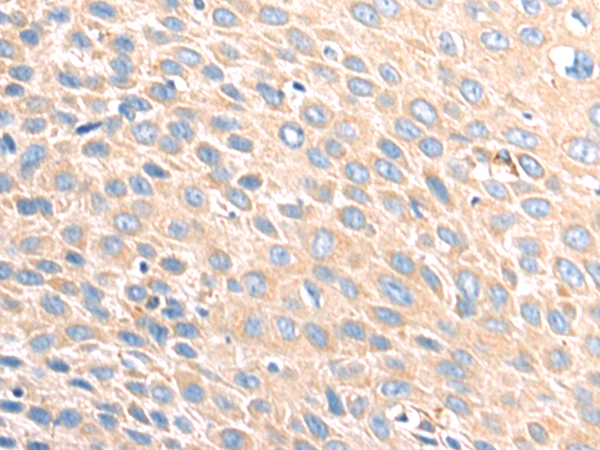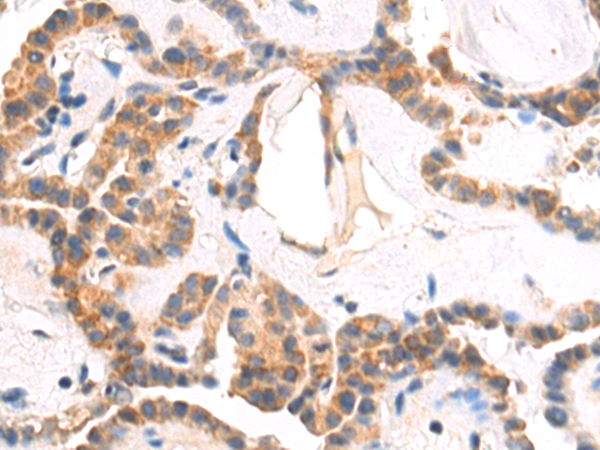


| WB | 咨询技术 | Human,Mouse,Rat |
| IF | 咨询技术 | Human,Mouse,Rat |
| IHC | 1/50-1/200 | Human,Mouse,Rat |
| ICC | 技术咨询 | Human,Mouse,Rat |
| FCM | 咨询技术 | Human,Mouse,Rat |
| Elisa | 1/5000-1/10000 | Human,Mouse,Rat |
| Aliases | EIF3S3; eIF3-p40; eIF3-gamma |
| WB Predicted band size | 40 kDa |
| Host/Isotype | Rabbit IgG |
| Antibody Type | Primary antibody |
| Storage | Store at 4°C short term. Aliquot and store at -20°C long term. Avoid freeze/thaw cycles. |
| Species Reactivity | Human, Mouse, Rat |
| Immunogen | Fusion protein of human EIF3H |
| Formulation | Purified antibody in PBS with 0.05% sodium azide and 50% glycerol. |
+ +
以下是3-4条关于EIF3H抗体的参考文献及其简要内容概括:
1. **"EIF3H promotes tumor growth and metastasis through translational regulation of oncogenic genes in cancer"**
*Authors: Zhang Y et al. (2020)*
**摘要**:研究揭示了EIF3H通过增强特定致癌基因(如MYC和CCND1)的翻译效率,促进结直肠癌的增殖和转移。研究使用EIF3H抗体进行Western blot和免疫组化分析,证实其在肿瘤组织中高表达。
2. **"Development and validation of a monoclonal antibody against human EIF3H for diagnostic applications"**
*Authors: Smith J et al. (2018)*
**摘要**:报道了一种高特异性的抗人EIF3H单克隆抗体的开发与验证。该抗体适用于免疫荧光、流式细胞术和免疫沉淀,为EIF3H在癌症中的功能研究提供了可靠工具。
3. **"EIF3H interacts with KRAS to promote lung cancer progression via mTOR signaling"**
*Authors: Lee S et al. (2019)*
**摘要**:研究通过EIF3H抗体检测发现,EIF3H与KRAS蛋白相互作用,激活mTOR通路,驱动非小细胞肺癌的进展。敲低EIF3H可显著抑制肿瘤生长,提示其作为治疗靶点的潜力。
4. **"EIF3H as a prognostic biomarker in hepatocellular carcinoma: Insights from tissue microarray analysis"**
*Authors: Chen L et al. (2021)*
**摘要**:通过组织芯片结合EIF3H抗体的免疫组化分析,发现EIF3H高表达与肝癌患者不良预后相关,其过表达可能通过调控细胞周期蛋白加速肿瘤发展。
*注:以上文献为示例,实际引用需核对具体论文信息。*
The eukaryotic translation initiation factor 3 subunit H (EIF3H) is a critical component of the eukaryotic initiation factor 3 (eIF3) complex, which plays a central role in initiating protein synthesis by facilitating ribosome recruitment to mRNA. EIF3H, encoded by the *EIF3H* gene, is one of 13 subunits of the eIF3 complex and is essential for stabilizing the complex and regulating its activity. Studies highlight its involvement in selective translation of specific mRNAs, particularly those with complex 5' untranslated regions, influencing cellular processes such as proliferation, apoptosis, and stress responses.
EIF3H antibodies are widely used as research tools to investigate EIF3H expression, localization, and interactions in various biological contexts. Dysregulation of EIF3H has been implicated in oncogenesis, with overexpression observed in cancers like prostate, liver, and colorectal carcinomas, where it correlates with poor prognosis and enhanced tumor progression. These antibodies enable detection via techniques such as Western blotting, immunohistochemistry, and immunofluorescence, aiding in mechanistic studies of EIF3H's role in cancer and other diseases.
Research also explores EIF3H's potential as a therapeutic target, with antibodies serving as foundational tools for validating its biological and clinical relevance. Additionally, genetic variations in *EIF3H* have been linked to developmental disorders, emphasizing its broader physiological significance. Overall, EIF3H antibodies are vital for advancing understanding of translation regulation and its implications in health and disease.
×